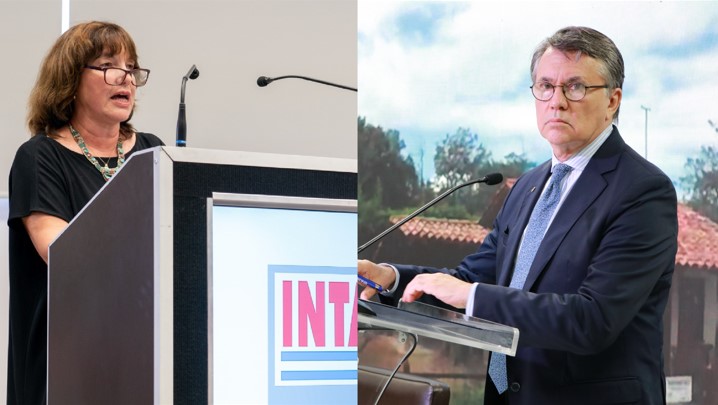The term AgTech encompasses a wide range of new technologies applied to agriculture to increase its efficiency, productivity, and sustainability.

Buenos Aires, 8 September 2021 (IICA). – Argentina’s National Agricultural Technology Institute (INTA) and the Inter-American Institute for Cooperation on Agriculture (IICA) have established a regional AgTech network with the goal to create a space for connection, collaboration, and collective construction to contribute to the emergence and development of high-impact innovative solutions for agriculture.
The term AgTech encompasses a wide range of new technologies applied to agriculture to increase its efficiency, productivity, and sustainability.
The Inter-American AgTech Network was created by the two institutes by means of a technical cooperation agreement signed by Susana Mirassou, President of INTA, and Manuel Otero, Director General of IICA. The agreement proposes the creation of a public-private work agenda aimed at addressing the challenges and opportunities surrounding a subject that is central to the present and future of the agrifood systems.
INTA is the state-run research agency for agriculture in Argentina. Since its foundation in 1956, it is focused on innovation as the engine of development and promotes cooperation to generate knowledge and technology. It has a 60-year history of collaboration with IICA, which is working actively to expand digital agriculture and its many benefits in Latin America and the Caribbean, a region where the process is still incipient.
“We are experiencing an accelerated digitalization process, which has quickened due to the pandemic and the drastic changes it has brought. Digital technologies have proven to be essential for the functioning of society and the economy. In the agrifood sector, we are facing serious challenges that we could tackle better if we strengthen digitalization through infrastructure, connectivity, and skills building”, stated Mirassou.
The president of INTA explained that in Argentina, over 140 AgTech startups have been created in recent years according to data from the Ministry of Agriculture, Livestock and Fisheries.
“This data shows the dynamism of innovation. Here at INTA, we have supported the development of this ecosystem with concrete actions that promote the interplay of innovators, entrepreneurs, and AgTech businessmen with a focus that prioritizes inclusion, is gender-oriented, provides opportunities for young people, drives family agriculture, and promotes a connection to rural areas”.
For his part, Manuel Otero underscored that the agreement reinforces the historic ties between INTA and IICA that should be projected into the future. “We are the only continent that has reached a consensus for the upcoming UN Food Systems Summit based on 16 messages. One of them refers to the need to accelerate agricultural digitalization, which will make a decisive contribution to achieving the Sustainable Development Goals (SDG). There is no time to waste”, said Otero.
Otero pointed out that AgTech is not just about innovative producers, but about the entire food production and consumption system.
“We need to have a holistic, systematic vision. The invitation to the UN Food Systems Summit has been a good thing, because we are thinking about how to build a more inclusive, more productive, and more environmentally friendly agriculture. AgTechs are the cells that will drive the agricultural transformation process that is already underway, and that is why we’re so committed to this topic”, maintained the Director General of IICA.
Also in attendance at the virtual signing of the agreement were Tomás Schlichter, Vice President of INTA; Carlos Parera, National Director; Juan Llorens, National Coordinator of Technological Cooperation and Institutional Relations; Karina Casellas, Director of the Center for Research in Economics and Prospective Studies; Carlos Vidal, a professional with the Center; and Guillermo Sánchez, Manager of Institutional Relations, who also served as moderator.
Representing IICA were Federico Villarreal, Director of Technical Cooperation; Jorge Werthein, Special Advisor to the Directorate General; Miguel Arvelo, Chief of Staff; Caio Rocha, Representative in Argentina and Coordinator for the Southern Region; Gabriel Delgado, Representative in Brazil; Federico Bert, Digital Agriculture Specialist; Federico Ganduglia, Specialist in Policies and Agribusiness; and Ignacio Hernaiz, Special Advisor for Institutional Relations.
Carlos Vidal, who coordinated the agreement on behalf of INTA, shared that the contents of the agreement were deliberated over by the two institutions for several months.
“The challenge became increasingly bigger. We are aware of the importance that the AgTech ecosystem has in the countries where its development is widespread, like in Argentina and Brazil, and of the need for other nations in the region to drive it. Our goal is to support startups with the aim of internationalization, since the sector is gaining importance in terms of exports of products and services. We are facing a major challenge”, he stated.
Federico Villarreal maintains that agricultural digitalization offers major opportunities but also a number of challenges in terms of strengthening and improving the agrifood systems.
“The level of digitalization in the Hemisphere is still low and unequal, but has begun to accelerate, in part due to the Covid-19 pandemic and in part due to the force of reality”, admitted Villarreal. “The process should be dynamic and inclusive”.
“We trust that the Network will strengthen the topic’s position on the agenda, drive the digitalization of State services associated with agriculture and food, generate meeting and working spaces, and promote collaboration among the startups of the sector” he added.
More information:
Institutional Communication Division
comunicacion.institucional@iica.int











